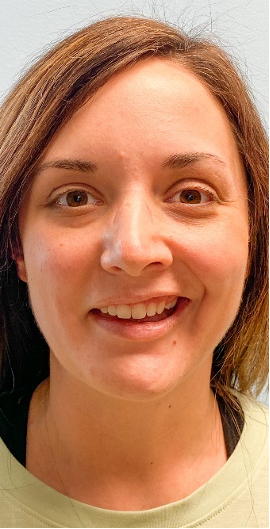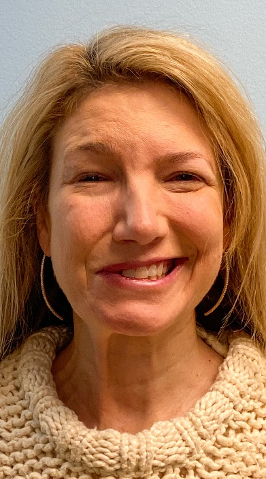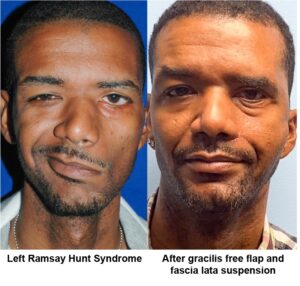Ramsay Hunt Syndrome
What is Ramsay Hunt Syndrome?

Ramsay Hunt Syndrome is a rare cause of facial paralysis caused by reactivation of the varicella zoster virus (also known as the chicken pox virus) affecting the facial nerve. The classic presentation of Ramsay Hunt Syndrome includes sudden onset (within 24-72 hours) facial paralysis, a blistering rash of the ear, and hearing loss and/or dizziness. Some patients will experience facial paralysis and hearing loss or dizziness without ever getting a rash (aka zoster sine herpete). The main distinguishing features between Bell’s palsy and Ramsay Hunt Syndrome include:
- A painful blistering rash is consistent with Ramsay Hunt Syndrome
- “Room spinning” dizziness is consistent with Ramsay Hunt Syndrome
- While Bell’s palsy patients often have discomfort around the ear, this pain is not triggered by touch or manipulation of the ear like the pain of Ramsay Hunt Syndrome
Patients with suspected Ramsay Hunt Syndrome should be evaluated by a healthcare provider immediately. The provider will perform a complete neurologic exam and may perform blood tests and imaging studies to rule out other causes of facial paralysis. If the diagnosis is confirmed to be Ramsay Hunt Syndrome, patients will typically be prescribed high-dose steroids (e.g., Prednisone) and an antiviral (e.g., Valtrex). It is very important for patients with acute Ramsay Hunt Syndrome to protect their eyes using eye drops, eye ointment, and eye taping. These eye care precautions improve comfort of the eye and protect its surface.
Recovery from Ramsay Hunt Syndrome

Compared to Bell’s palsy, fewer people make a complete recovery from Ramsay Hunt Syndrome, although many people do fully recover. However, recovery can take longer than recovery from Bell’s palsy. Patients almost always recover tone and facial movement. However, many times aberrant facial nerve regeneration occurs where the facial nerve makes abnormal connections with facial muscles. This “miss wiring” leads to the same symptoms seen in chronic Bell’s palsy:
- Facial asymmetry
- Smile asymmetry
- Facial synkinesis: Involuntary facial movements such as eye closing with smile
- Narrowing of the eye
- Facial tightness
- Neck tightness
- Deep nasolabial fold (aka smile lines)
- Chin dimpling
- Platysma banding
Rarely, patients with Ramsay Hunt Syndrome do not recover significant facial movement and reanimation procedures such as cross-facial nerve grafts and nerve transfers can be performed to restore facial function and symmetry.
Ramsay Hunt Syndrome Treatments
Patients with Ramsay Hunt Syndrome have many treatment options to improve their facial function and symmetry. These treatments can improve smile symmetry, facial symmetry, facial synkinesis, and neck and face tightness. Potential treatment options for patients with Ramsay Hunt Syndrome include:
- Selective denervation
- DAO Excision
- DLI Excision
- Asymmetric facelift
- Botox for facial paralysis
- Filler for facial paralysis
- Targeted facial physical therapy

Consultation at the UNC Facial Nerve Center
Dr. Miller is an expert at evaluating and treating patients with Ramsay Hunt Syndrome. As both a facial paralysis surgeon and a facial paralysis patient, he understands how difficult it can be for patients to cope with their facial paralysis. The unpredictability of speed and completeness of recovery from Ramsay Hunt Syndrome can be especially difficult for patients.
As an expert in evaluating and treating patients with Ramsay Hunt Syndrome, Dr. Miller will ensure the correct diagnosis is made and work with patients to develop a personalized treatment plan. He understands each patient with Ramsay Hunt Syndrome is unique and treatment should be customized to the patient. Dr. Miller is happy to see you for a consultation visit whether you have just been diagnosed with Ramsay Hunt Syndrome, or if you have lived with this condition for years.
To schedule a consultation visit at the UNC Facial Nerve Center, please call 984-974-2255.